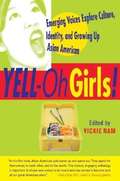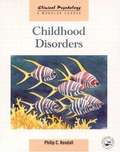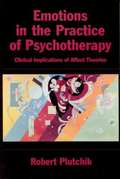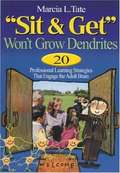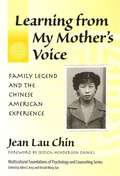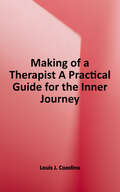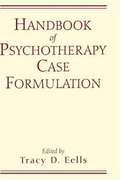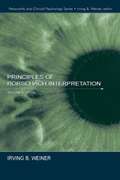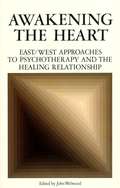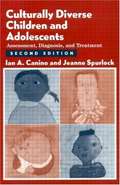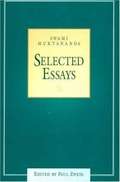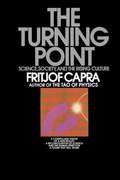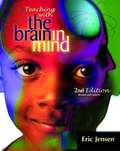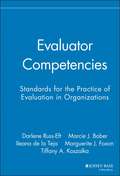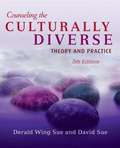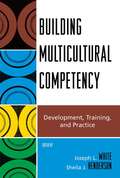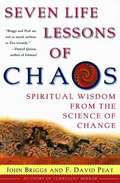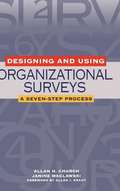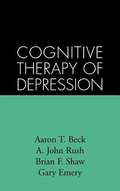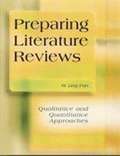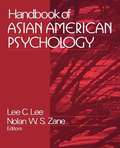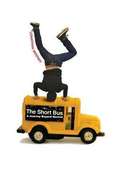Special Collections
Alliant International University Psychology Collection
Description: Alliant International University donated an electronic collection of psychology books to the Bookshare library as part of their school-wide effort to scan and share its course materials with Bookshare users across the country. #general
- Table View
- List View
Yell-Oh Girls! Emerging Voices Explore Culture, Identity, and Growing Up Asian American
by Vickie NamThe collection includes 80 brief selections (most are under three pages) by budding writers between 15 and 22 years of age, from all over the country.
Childhood Disorders
by Philip KendallIn Childhood Disorders, Philip C. Kendall provides an up-to-date summary of the current information about the psychological disorders of childhood - their causes, nature and course - together with discussion and evaluation of the major models that guide psychological thinking about the disorders. Drawing on the research literature and case studies from his own clinical work, Kendall describes each of the major childhood disorders. He goes on to give a detailed consideration of the criteria used to make the diagnoses, a presentation of the latest research findings on the nature of the disorder, and an overview of the methods used and evaluations conducted for the treatment of the disorders. Throughout, the range of normal behavioural variations is set as the backdrop against which to make judgements about psychological disorders, and the role of the family in the onset and course of psychological difficulties is explored. Within the coverage of the treatments of childhood disorders, emphasis is placed upon those treatments that have been empirically evaluated and found to be effective in producing beneficial change for the children. In the end, a series of provocative questions are raised and the reader is asked to recognise and think about the personal and social implications of the decisions that we make regarding how we deal with the disorders of childhood. Childhood Disorders will provide an accessible, up-to-date introduction to the field for both students and professionals alike.
Emotions in the Practice of Psychotherapy
by Robert PlutchikThe circumplex model of emotions has been an extremely valuable paradigm for understanding personality, psychopathology, and interpersonal relations over the past 30 years. In this volume, Robert Plutchik extends his model to inform the practice of psychotherapy across all theoretical orientations and therapeutic modalities. Beginning with a description of the role of emotions in symptom formation, Plutchik demonstrates how the circumplex model has relevance not only to emotions, but to personality traits, personality disorders, and ego defenses as well. He presents a unique compendium of therapist tactics for uncovering emotions and encouraging their expression. He examines the many distinctions between social conversation and therapeutic communication and describes specific strategies of intervention found to be helpful to therapeutic enterprise.
"Sit and Get" Won't Grow Dendrites
by Marcia TateThis book discusses best teaching practices in a fun and engaging way.
Learning from My Mother's Voice
by Jean Lau Chin"As the reader takes Jean Lau Chins guided tours through myth and cultural history, it is clear that these stories are more than entertainment: They represent cultural messages about living as a woman. The juxtaposition of Chinese and Western myths with their similarities and differences, followed by the authors incisive analysis of contemporary stories depicting Asian women in print and on the screen, provide culturally driven connections to perceptions and behaviors of Chinese women both individually and in relation to the world. Through these stories, a rich tapestry of information about Chinese women and Chinese American women emerges. The stereotypical Chinese woman fails to appear as the various lenses of ethnicity, gender, location, and epoch make explicit the diversity that exists within any ethnic group and liberate us by providing an informed array of images and possibilities." From Book
The Making of a Therapist
by Louis CozolinoTo help fellow psychotherapists stay sane by covering what wasn't taught in school, Cozolino (Pepperdine U., CA) offers advice based on his extensive clinical experience. Emphasizing the personal and emotional aspects of the profession rather than its theoretical orientations (though he does advise training in at least two), he presents survival strategies, principles, and suggested readings. Annotation ©2004 Book News, Inc., Portland, OR (booknews.com)
Handbook of Psychotherapy Case Formulation
by Tracy D. EellsPsychotherapy case formulation : history and current status / Tracy D. Eells -- The traditional psychoanalytic approach to case formulation / Stanley B. Messer, David L. Wolitzky -- The Core Conflictual Relationship Theme : a basic case formulation method / Lester Luborsky -- Cyclical maladaptive patterns : case formulation in Time-Limited Dynamic Psychotherapy / Hanna Levenson, Hans H. Strupp -- The Plan Formulation Method / John T. Curtis, George Silberschatz -- The Idiographic Conflict Formulation method / J. Christopher Perry -- Configurational Analysis : states of mind, person schemas, and the control of ideas and affect / Mardi J. Horowitz, Tracy D. Eells -- Case formulation in interpersonal psychotherapy of depression / John C. Markowitz, Holly A. Swartz -- Interpersonal case formulation : describing and explaining interpersonal patterns using the structural analysis of social behavior / William P. Henry -- Plan Analysis / Franz Caspar -- Case formulation in Cognitive Analytic Therapy / Anthony Ryle, Dawn Bennett -- Cognitive-Behavioral Case Formulation / Jacqueline B. Persons, Michael A. Tompkins -- Case formulation in Dialectical Behavior Therapy for borderline personality disorder / Kelly Koerner, Marsha M. Linehan -- Case formulation in behavior therapy : problem-solving and functional analytic strategies / Arthur M. Nezu ... [et al.] -- Case formulation in process-experiential therapy / Rhonda Goldman, Leslie S. Greenberg.
Principles of Rorschach Interpretation
by Irving B. WeinerBooknews A clinician-friendly guide to using the Rorschach inkblot test. Part I addresses basic considerations, with chapters on conceptual and empirical foundations. Part II comprises six chapters on elements of interpretation contributing to Rorschach protocol, and illustrates guidelines for translating Rorschach findings into descriptions of structural and dynamic aspects of personality functioning. Part III presents 10 case illustrations of how interpretive principles can be used to identify personality functioning in clinical practice. Annotation c. by Book News, Inc., Portland, Or.
Awakening the Heart
by John Welwoodcontrast between eastern and western perspectives on the mind and counseling.
Culturally Diverse Children and Adolescents
by Ian A. Canino and Jeanne SpurlockChild assessment and treatment is complicated by numerous factors: developmental variables, how and where symptoms are expressed, and the different ways that parents and teachers may perceive and define problem behavior. The clinician's task is further compounded when clients are culturally diverse children and adolescents dealing with multiple social stressors. Now in a revised and updated second edition, this volume guides mental health practitioners in conducting culturally competent, effective work with economically disadvantaged youngsters from African American, Asian American, Latino, and Native American backgrounds. From distinguished clinicians and educators Ian A. Canino and the late Jeanne Spurlock, the new second edition is sure to succeed its predecessor as a widely used clinical resource and text.
Selected Essays
by Swami Muktananda and Paul ZweigResponding to his students' wishes, Swami Muktananda's series of talks and informal dialogues on spiritual practices and truths includes many of his favorite teaching stories.
The Turning Point
by Fritjof CapraCapra discusses the philosophical implications of modern science.
Teaching with the Brain in Mind
by Eric JensenIn easy to understand, engaging language, Jensen provides a basic orientation to the brain and its various systems and explains how they affect learning. After discussing what parents and educators can do to get children's brains in good shape for school, Jensen goes on to explore topics such as motivation, critical thinking skills, environmental factors, the "social brain," emotions, and memory and recall. He offers fascinating insights on a number of specific issue, including * How to tap into the brain's natural reward system. * The critical link between movement and cognition. * The impact on learning of environmental factors such as lighting, temperature, and noise. * The value of feedback. * The importance of prior knowledge and mental models. * Why stress impedes learning. * How social interaction affects the brain. * How to help students improve their ability to encode, maintain, and retrieve learning. The repeated message to educators is simple: You have far more influence on students' brains than you realize. And you have an obligation to learn as much as you can to take advantage of the incredible revelations that science is providing. The revised and updated Teaching with the Brain in Mind, 2nd edition helps you do just that.
Evaluator Competencies
by Darlene F. Russ-Eft and Marge J. Bober and Ileana de la Teja and Tiffany A. Koszalka and Marguerite FoxonEvaluator Competencies, based on research by the International Board of Standards for Training, Performance, and Instruction, identifies the competencies needed for evaluating organizational settings.
Counseling the Culturally Diverse
by Derald Wing Sue and David SueSue and Sue's important work about counseling diverse populations.
Building Multicultural Competency
by Joseph White and Sheila HendersonResearchers have discovered that the mental health workforce lacks adequate training and sufficient number of staff to meet the needs of a growing multicultural population. Promising Practices in Multicultural Competency Training addresses this problem, and provides a workable solution relevant to today. Using a Multiracial/Multiethnic/Multicultural Competency Building model, individuals who are dedicated to the study of psychology will learn how to provide mental health services, education, and training to the growing multicultural population.
Seven Life Lessons of Chaos
by John Briggs and F. David PeatIntroduces the major ideas of chaos theory. Shows how they can be used metaphorically in day to day living.
Designing and Using Organizational Surveys
by Allan H. Church and Janine WaclawskiThis book will serve as an excellent primer for executives and practitioners who are about to embark on an organizational survey
Cognitive Therapy of Depression
by Aaron T. BeckClassic in psychology. Discusses the cognitive behavioral perspectives of treating depression.
Preparing Literature Reviews
by M. Ling PanHow to review and synthesize research reports for academic writing such as a thesis or dissertation.
Handbook of Asian American Psychology
by Lee C. Lee and Nolan W. S. ZaneWith the landmark publication of the Handbook of Asian American Psychology, professionals, students, and researchers now have a handy reference on topics that are germane to the understanding of Asian Americans. In recent years, the Asian American population has seen an explosion not only in size but also in diversity. As a result, the research and literature has reflected this explosion with a mass of new material presented in various journals on different Asian American subgroups. However, much of these research articles focus too narrowly on one subgroup, on disparate topics, and are published in varied disciplinary journals. Until now, there hasnÆt been a single-volume resource that integrates descriptions and evaluations of current research on all ethnic subgroups of Asian Americans. The Handbook of Asian American Psychology stands alone as the most comprehensive handbook on Asian Americans. A select group of prominent scholars and clinicians focus on a wide range of topics, including: + Racism + Family violence + Addictive behaviors + Interracial marriage + Academic achievement and performance + Interpersonal relations + Career development + Mental health services and treatment This bold new handbook provides insights into the diverse and varied nature of Asian American cultures and communication and makes a distinguished contribution to the body of knowledge on Asian Americans. It will be highly valued by professionals, students, and academics in ethnic studies, psychology, clinical and counseling psychology, social welfare, developmental psychology, gender studies, family studies, nursing, gerontology, research methods, and interpersonal communication
Cross-Cultural Psychotherapy
by Charles NegyTable of Contents Part I: Conceptual and Practical Considerations for Effective Therapy 1. Treating Dissimilar Clients: No Longer the Road Less Traveled 1 Charles Negy 2. Competencies for Providing Services to Dissimilar Clients 23 Anthony F Greene 3. Cross-Cultural Assessment: Conceptual Framework and Guiding 35 Principles Lisa A. P. Sanchez-Johnsen and Israel Cuellar 4. Religious Bigotry in Multicultural Psychology and Therapy 61 Charles Negy and Christopher J. Ferguson Part II: Racial and Ethnic Populations 5. Introduction to Hispanic Americans and Latinos/as 77 Miguel Angel Cano and Flor Vanessa Perez 6. Mexican American Psychology: Theory and Clinical Application 85 Linda G. Castillo and Miguel A. Cano 7. Psychological Issues with Puerto Ricans: A Review of Research Findings 103 Consuelo Arbona and Baisilisa Virella 8. Immigration History and Therapy Considerations with Hispanics from Cuba, Central and South America 133 Edward Anthony Delgado-Romero, Angela Rojas-Vilches, and Kimber L. Shelton 9. African American Clients: History and Therapy Considerations 161 Nique Fajors and Charles Negy 10. Caucasian (White) Americans: The Forging of an Identity and Culture 187 Christopher Aaron Myers, Dawna Cricket Martita Meehan, and Charles Negy 11. Assessment and Psychotherapy with Asian Americans 207 Eddie Yu-Wai Chiu 12. Cultural Bereavement and Sense of Coherence: Implications for Psychotherapy with Southeast Asian Refugees 237 Eddie Yu-Wai Chiu 13. Psychotherapy with Asian Indian Immigrants: Evolving Issues 251 and Concerns Vidyulata Kamath, Benjamin A. Orooji, and Christopher J. Ferguson 14. Multiracial/ethnic Clients: History, Models, and Treatment Implications 269 Charles Negy, Jenny L Klein, and Eva D. C. Brantley 15. Therapy with Native American Clients 289 Charles Negy 16. Mental Health Counseling with Arab Americans 309 Christopher J. Ferguson PART III: Other Culturally Diverse Populations 17. Feminist Therapies: Working with Diverse Women 327 Shelley M. Park 18. Affirmative Counseling and Psychotherapy with Lesbian, Gay, Bisexual, and Transgender Clients 363 Dean M. Amadio and Ruperto M. Perez 19. Working with Disabilities: Client, Therapist, Treatment, and Family Variables 401 Cliff McKinney 20. Older Adults: The Emerging Population for the 21st Century 413 Andrea Dixon Rayle
The Short Bus
by Jonathan MooneyA young man once called unteachable journeys across America to investigate the lives of those, like himself, who are forced to create new ways of living in order to survive Labeled "dyslexic and profoundly learning disabled with attention and behavior problems," Jonathan Mooney was a short bus rider--a derogatory term used for kids in special education and a distinction that told the world he wasn't "normal. " Along with other kids with special challenges, he grew up hearing himself denigrated daily. Ultimately, Mooney surprised skeptics by graduating with honors from Brown University. But he could never escape his past, so he hit the road. To free himself andto learn how others had moved beyond labels, he created an epic journey. He would buy his own short bus and set out cross-country, looking for kids who had dreamed up magical, beautiful ways to overcome the obstacles that separated them from the so-called normal world. InThe Short Bus, his humorous, irreverent, and poignant record of this odyssey, Mooney describes his four-month, 35,000-mile journey across borders that most people never see. He meets thirteen people in thirteen states, including an eight-year-old deaf and blind girl who likes to curse out her teachers in sign language. Then there's Butch Anthony, who grew up severely learning disabled but who is now the proud owner of the Museum of Wonder. These people teach Mooney that there's no such thing as normal and that to really live, every person must find their own special ways of keeping on. The Short Bus is a unique gem, propelled by Mooney's heart, humor, and outrageous rebellions.
Theories of Illness
by George Peter MurdockTheories of Illness establishes a new landmark in comparative studies. Utilizing concepts from modern medicine and anthropological theory, Professor Murdock distinguishes the natural causes of illness from theories of supernatural causation. He subdivides the latter into theories of illness that are related to aggression (witchcraft, sorcery, and spirit aggression) and those which are related to guilt and a sense of sin (taboo violation and mystical retribution). Obviously, these relate to man's most basic beliefs as revealed in early religions.
Disabilities Online Services Center
by Nina GhiselliAppropriate services and accommodations allow students~with disabilities to have opportunities equal to their nondisabled peers. This dissertation demonstrates how services to students with disabilities can be increased through an online service entitled Disabilities Online Services Center (DOSC). This unique service allows students to request accommodations and attain information about academic policies and services external to the academic community. Additionally, teachers, training directors, tutors, and others involved in education and training can obtain information about how to make the academic and internship environment more accessible. Providing these services electronically increases information and access to various groups while increasing compliance with the Americans with Disabilities Act. This dissertation includes the theory, rationale, and steps made in the creation of DOSC. DOSC is currently in its conceptual stage and has not yet been implemented.
